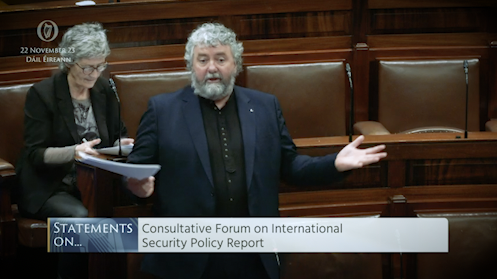- Pringle: We need a policy that recognises the importance of inshore fishing
- Pringle: Disabled people and carers face crisis of State neglect
- Pringle: Failed FF/FG housing policies forcing people to put their lives on hold
- Pringle welcomes Donegal council motion on Occupied Territories Bill: ‘We cannot stand by in the face of genocide’
Pringle: Consultative forum skewed towards those who oppose or seek to weaken Irish neutrality
- Updated: 23rd November 2023

Independent TD for Donegal, Thomas Pringle, slammed the Consultative Forum on International Security Policy, saying it was skewed towards those who are opposed to Ireland’s neutrality or seek to weaken it.
Addressing the Dáil on Wednesday, Deputy Pringle said: “It is no secret that I was very vocally against this forum and its set-up. The constitution of the panels at the forum was completely skewed towards those who are either opposed to Ireland’s current policy of neutrality, or those who seek to weaken it. Those with expertise in peacebuilding, arms control and humanitarian work were a significant minority on the panels and so you can understand why I am very sceptical of the report that came from this forum.
“We have said time and time again that if the government wanted to ‘start a national conversation’, as the Tánaiste mentions in his opening statement, then this should have been done in the form of a Citizens’ Assembly.
“This forum was not a ‘national discussion’. It was a discussion between security experts and therefore those who have an interest in advancing military capabilities in Ireland, despite the opinion of the population. The Chair’s report itself admitted this, saying: ‘it must be borne in mind that the submissions were not a random or representative sample of the population, rather the views of citizens engaged in these issues; therefore, it would be unwise to extrapolate from these views to the population-at-large.’
“But yet that’s what the Tánaiste does in his opening statement here today – he says that this is a national conversation and this is what has been taking place here, when it clearly has not,” he said.
The deputy was speaking during statements on Consultative Forum on International Security Policy Report.
Deputy Pringle said: “It’s an absolute sham what’s happening here, and it’s an absolute dressing up to get participation in military responses right across the world that we’re seeing here. And what’s in the Tánaiste’s statement is actually just a way of making sure that will happen on behalf of the government, on behalf of Fianna Fáil, Fine Gael and the Greens who are willing to participate in this. And that is absolutely wrong.
“And the Government will make sure that they won’t give the people a say in relation to this because the one thing they can be certain of is that the Irish people will actually have a different view than the Government would have, and the Irish people would ensure that this would not happen and that the kind of ongoing militarisation that Fianna Fáil has been pursuing and Fine Gael and the Greens have been pursuing will not happen and will not happen in the future either.
“I strongly disagree with the Chair’s opinion that: ‘It would seem that Ireland’s policy of neutrality is neither a necessary nor a sufficient condition for Ireland’s global standing as a force for good in international affairs.’ There are many organisations who would also disagree with this assessment, including the New Agenda Coalition, of which Ireland is a member, who are committed to nuclear disarmament.
“Ireland’s policy of neutrality has been praised many times by NGOs and even by UN officials. It is seen as a great asset to peace negotiations in the likes of Colombia, and to discussions of things like nuclear disarmament,” he said.
Deputy Pringle said: “It wasn’t just the makeup of the forum that was questionable, but also the content of it. I was disappointed by the lack of focus on biodiversity, especially since the greatest threat to our collective security is the climate change and biodiversity crisis. Although cybersecurity is important, it will mean very little when we are faced with the enormous threat of climate change.”



